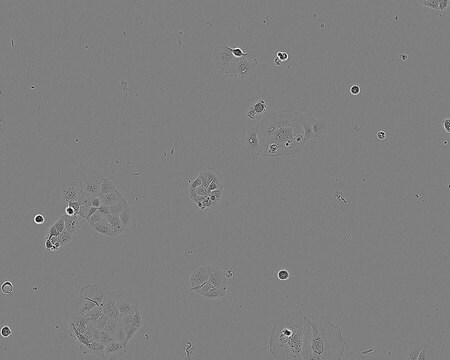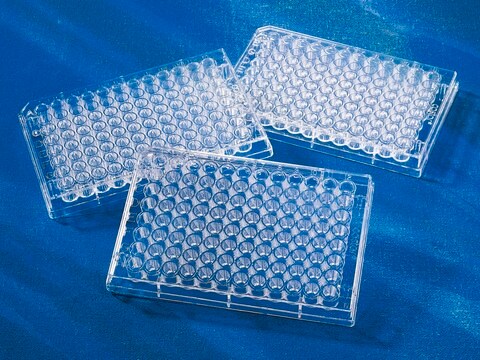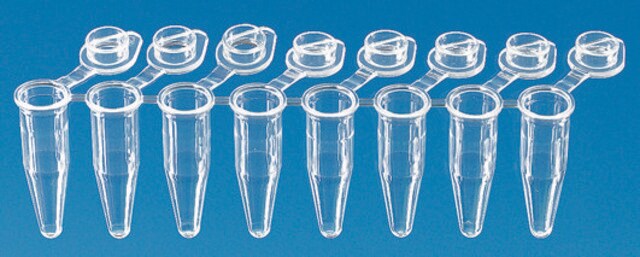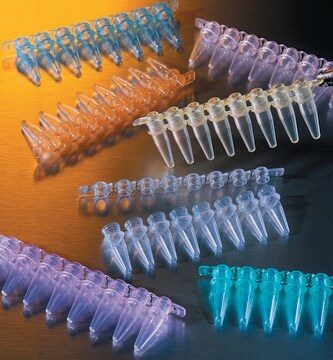SW 620 Cell Line human
87051203, human colon, Epithelial
Synonim(y):
SW620 Cells
Zaloguj sięWyświetlanie cen organizacyjnych i kontraktowych
About This Item
Kod UNSPSC:
41106514
Polecane produkty
Nazwa produktu
SW 620 Cell Line human, 87051203
pochodzenie biologiczne
human colon
opis
Human Caucasian colon adenocarcinoma
tryb wzrostu
Adherent
kariotyp
2n = 46, hyperdiploid, modal no. 50
morfologia
Epithelial
produkty
Carcinoembryonic antigen (CEA)
receptory
Not specified
metody
cell culture | mammalian: suitable
powiązane choroby
cancer
Warunki transportu
dry ice
temp. przechowywania
−196°C
Pochodzenie linii komórkowej
Human Caucasian colon adenocarcinoma
Opis linii komórkowej
Established from the lymph node of a 51 year old Caucasian male. The cells synthesise small quantities of CEA and are highly tumorigenic in nude mice. The established cell line consists of small spherical and bipolar cells resembling microvilli.The Y chromosome could not be detected in this cell line by short tandem repeat (STR)-PCR analysis when tested at ECACC. It is a known phenomenon that due to the increased genetic instability of cancer cell lines the Y chromosome can be rearranged or lost resulting in lack of detection. The cell line is identical to the source provided by the depositor based on the STR-PCR analysis.
Zastosowanie
SW 620 cell line has been used:
- as an in vitro model to study key cellular processes required for metastasis. It has also been used to study the effects of transforming growth factor-β (TGF-β) pathway and heat shock protein 90 (Hsp90) on the growth of cells
- to study the relationship between zinc intake and risk of colon cancer
- to test for intrahepatic tumor cell growth after intraportal injection
Tumourigenicity studies
Profil DNA
STR-PCR Data: Amelogenin: X
CSF1PO: 13,14
D13S317: 12
D16S539: 9,13
D5S818: 13
D7S820: 8,9
THO1: 8
TPOX: 11
vWA: 16
CSF1PO: 13,14
D13S317: 12
D16S539: 9,13
D5S818: 13
D7S820: 8,9
THO1: 8
TPOX: 11
vWA: 16
pożywka hodowlana
L15 + 2mM Glutamine + 10% Foetal Bovine Serum (FBS).
Rutyna subkultury
Split sub-confluent cultures (70-80%) 1:3 to 1:6 i.e. seeding at 2-4x10,000 cells/cm2 using 0.25% trypsin or trypsin/EDTA; No CO2; 37°C.
Inne uwagi
Additional freight & handling charges may be applicable for Asia-Pacific shipments. Please check with your local Customer Service representative for more information.
Ta strona może zawierać tekst przetłumaczony maszynowo.
Wybierz jedną z najnowszych wersji:
Certyfikaty analizy (CoA)
Lot/Batch Number
Przepraszamy, ale COA dla tego produktu nie jest aktualnie dostępny online.
Proszę o kontakt, jeśli potrzebna jest pomoc Obsługa Klienta
Masz już ten produkt?
Dokumenty związane z niedawno zakupionymi produktami zostały zamieszczone w Bibliotece dokumentów.
Nasz zespół naukowców ma doświadczenie we wszystkich obszarach badań, w tym w naukach przyrodniczych, materiałoznawstwie, syntezie chemicznej, chromatografii, analityce i wielu innych dziedzinach.
Skontaktuj się z zespołem ds. pomocy technicznej






